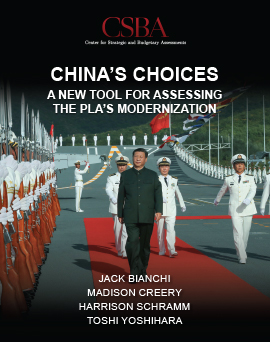
All militaries confront resource tradeoffs. As China and the United States enter a period of intensifying military competition, understanding the tradeoffs the two must face and their likely consequences will become ever more important. Yet, without a better understanding of China’s own resourcing constraints and associated vulnerabilities, policymakers lack the critical insights to holistically assess the state of the competition and develop effective strategies.
To advance the policy community’s understanding of China’s budgetary choices, relative tradeoffs, and constraints on military modernization, the Center for Strategic and Budgetary Assessments (CSBA) created a one-of-a-kind model for exploring Beijing’s defense portfolio. The China Strategic Choices Tool (SCT) is a user-friendly, web-based application that allows participants to step into the shoes of Chinese statesmen and defense planners to make high-level resourcing and force structure decisions regarding the future of China’s military. By simulating investments in and divestments from a broad portfolio of PLA capabilities, the tool allows users to generate alternative future force structures within a budgetary constraint.
In China’s Choices, authors Jack Bianchi, Madison Creery, Harrison Schramm, and Toshi Yoshihara introduce the China SCT and the rigorous methodology that informs its functions. More broadly, the report illustrates how analysts can use relative cost estimates—as opposed to absolute cost estimates—to overcome Beijing’s opacity on defense spending, evaluate China’s defense modernization tradeoffs, and advance the development of Allied competitive strategies against a resource-constrained Beijing.



























